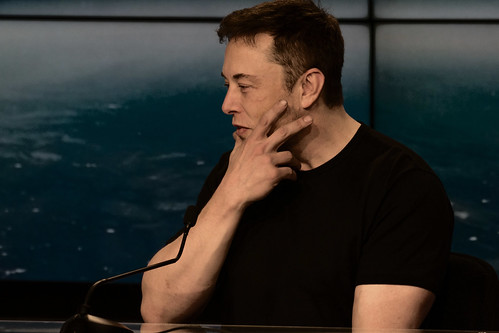On December 22 Elon Musk elaborated on his endorsement of the supposedly "far-right" German party Alternative for Germany in an op-ed in the Welt am Sonntag, "a sister publication" of Politico. Why the sister publication would fail to include the full text in English of Musk's piece (651 words) is rather puzzling (nor does @elonmusk post it on his X account), but it is clear that the mainstream German press doesn't want it to get any more attention than it has gotten already from the Welt (which has a subscription firewall). I have only been able to find it on the website of the Junge Freiheit, which is close to the AfD and described (predictably) by Wikipedia in the same negative terms it uses for the AfD itself and the supposedly antipodal "far-left" party BSW. So I will reproduce the Google translation of the German text below.
First, however, two important points should be noted.
1. Musk fails to mention the elephant in the room, which continues to be studiously avoided in public debates, also by the AfD and the BSW, although this is the most important point on which the two "extreme" parties agree, in opposition to ALL the other mainstream parties (CDU, SPD, Greens, FDP): opposition to military support for Ukraine and to anti-Russian sanctions, including the US sabotage of the Nord Stream pipeline (see articles by Seymour Hersh here, here, here, here, here, here, here, here, and here). The war and the sanctions are the primary reasons for Germany's economic decline. To tweak James Carville, It's the war, stupid. Still, this blatantly obvious fact is the last thing one is likely to hear in public debates, even from the AfD or the BSW, or in the mainstream press.
2. Unfortunately, and unlike the BSW, both Musk and the AfD - as well as Trump - fail to mention the other elephant in the room, which is the Israeli genocide in Gaza. The grossly immoral and recklessly dangerous support of Zionist imperialism (to put it mildly), which in the end will destroy Israel as a state just as US/NATO imperialism (for the last 34 years!) has already destroyed Ukraine, has been repeatedly and abundantly described by many commentators, none of whom are mentioned in the mainstream Western propaganda organs but are (fortunately) easy to find on the internet, e.g. Jeffrey Sachs, John Mearsheimer, Douglas Macgregor, Scott Ritter, Ray McGovern, Philip Giraldi, Chas Freeman, Lawrence Wilkerson, Max Blumenthal, Larry Johnson, Michael Hudson, Richard Wolff and others including some no longer with us like Stephen F. Cohen, arguably the preeminent US scholar on Russia but eschewed by the mass media ever since he started telling the truth about post-Soviet Russia, Putin, and Ukraine:
I had been arguing for years [before 2014] - very much against the American political-media grain - that a new US-Russian Cold War was unfolding, driven primarily by politics in Washington, not in Moscow. For this perspective, I had been largely excluded from influential print, broadcast, and cable outlets where I had previously been welcomed ["To My Readers," War With Russia? 2019, p. 7].
With these two important caveats, one can only shake one's head at the obtuseness - feigned or not but in either case unforgivable - of Franz-Walter Steinmeier, the former SPD politician who has used his current "neutral" position as Bundespräsident to do nothing but double down on the coalition government's unquestioning support of Ukraine and Israel, in total subservience to the US, and warn voters against "right-wing extremism", "protest voting" and "foreign influence", always with carefully inexplicit but unmistakable reference to the AfD, the party that is now No. 2 in Germany and stronger than his own (former) party, the SPD. Especially coming from him, his reaction to Musk's endorsement of the AfD is risibly hypocritical:
External influence is a threat to democracy. Be it covert (...) or open and blatant, as is currently being practiced particularly intensively on Platform X [see here, orig. German here].
Here is the full text of Musk's piece (Google translation here, orig. German here):
-- -------
Germany is at a critical juncture - its future teeters on the brink of economic and cultural collapse. As someone who has made significant investments in Germany's industrial and technological landscape, I believe I have the right to speak openly about my political orientation. The Alternative for Germany (AfD) is the last spark of hope for this country. Here's why:
Economic revival: The German economy, once the engine of Europe, is now mired in bureaucracy and overwhelming regulations. The AfD has understood that economic freedom is not only desirable, but necessary. Its approach of reducing government over-regulation, cutting taxes and deregulating the market reflects the principles that made Tesla and SpaceX successful. If Germany wants to regain its industrial strength, it needs a party that doesn't just talk about growth, but also takes political action to create an environment where companies can thrive without heavy government intervention.
A nation needs clear borders and identityImmigration and national identity: Germany has opened its borders to a very large number of migrants. Although this was done with humanitarian intentions, it has led to significant cultural and social tensions. The AfD advocates a controlled immigration policy that prioritizes integration and the preservation of German culture and security. This is not about xenophobia, but about ensuring that Germany does not lose its identity in the pursuit of globalization. A nation must preserve its core values and cultural heritage in order to remain strong and united.
Energy policy as the key to independenceEnergy and independence: The energy policy pursued by the current coalition is not only economically costly but also geopolitically naïve. Germany's decision to phase out nuclear power and instead rely heavily on coal and imported gas, as well as on volatile wind and solar power, without the battery storage on the grid needed to ensure stability of the electricity supply, has left the country vulnerable, especially in terms of power disruptions.
The AfD takes a pragmatic approach to the energy issue and advocates a balanced approach. I hope that they will consider expanding safe nuclear energy combined with battery storage to cushion large fluctuations in electricity consumption, because that is the obvious solution.
The traditional parties have failedPolitical realism: The traditional parties have failed in Germany. Their policies have led to economic stagnation, social unrest and an erosion of national identity. The AfD, even though it is described as far-right, represents a political realism that resonates with many Germans who feel that their concerns are ignored by the establishment. It addresses the problems of the day - without the political correctness that often obscures the truth. The portrayal of the AfD as far-right is clearly false, considering that Alice Weidel, the party's leader, has a same-sex partner from Sri Lanka! Does that sound like Hitler to you? Come on!
(Note: You can view every article as one long page if you sign up as an Advocate Member, or higher).






